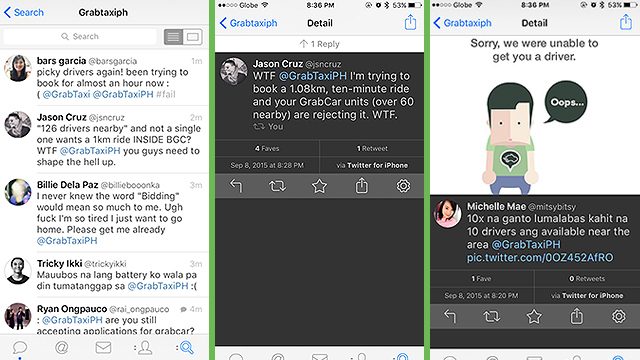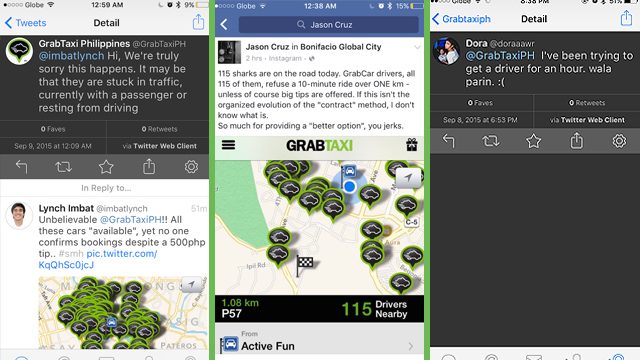SUMMARY
This is AI generated summarization, which may have errors. For context, always refer to the full article.

MANILA, Philippines – (UPDATED) Thousands of commuters were stranded on Tuesday night, September 8, after a downpour caused floods in parts of Metro Manila.
Along the capital’s major roads, like EDSA and Taft Avenue, people started walking home due to the lack of available public transportation. Those with vehicles endured hours on the road due to bottlenecks. (READ: Palace: MMDA ordered to manage heavy traffic Tuesday night)
Netizens took to social media to vent their frustration on the traffic situation. Among the posts that made rounds on the Internet were from frustrated GrabTaxi and GrabCar users, who pointed out how the app-based transport services added to their frustration.
On Facebook, former Metropolitan Manila Development Authority (MMDA) “traffic czar” Yves Gonzalez posted about the case of a student who was waiting for a GrabCar driver to accept her offer. The driver, it turned out, was just beside her, ignoring her all along.
“The experience of this girl (posted on Jason Cruz’s thread) would be funny if only it wasn’t the most perfect example of what’s obviously wrong with GrabTaxi/Car’s current booking system, which gives choosy drivers total control over the hapless commuter,” Gonzalez said.
While GrabTaxi markets itself as an alternative from abusive taxi drivers, Gonzalez noted that the app instead is being used by drivers to exploit commuters.
“The current booking system of Grab (the company) unduly promotes the interests of the peers (both driver and operator) to the detriment of the rider or commuter. It has institutionalized two prohibited principles in taxi-type common carriers: asking for additional payment on top of the stated fare, and refusal to convey due to the intended destination of the commuter,” Gonzalez told Rappler.
GrabTaxi is a mobile application, founded in Malaysia in 2011, that allows users to book taxis. GrabCar is the app’s alternative form of service which uses cars through licensed partners, in case there are no available taxis during rush hour.
Institutionalizing bribery?
According to Gonzalez, the current “tip” system is nothing more but a bribe for the driver to accept a trip. This, plus the thousands of hours and pesos lost in the platform is not in the best interest of the commuter.
“Pesos are lost as the current mentality of a lot of the drivers is to wait for a big fat ‘tip’ to be inputted by the rider, who out of desperation to get a ride will succumb to the broken system and offer this ‘tip.’ The system has made a mockery of the traditional definition of a tip, which is something given after a job or service is well rendered,” he said.
The current set-up, he added, puts commuters in a helpless state, forced to resort to bribing Grab drivers.
“Commuters also have no resort when no driver wants to accept their trip, even if there are hundreds of peer vehicles claimed to be ‘available’ in his/her area. An intended trip can be offered to hundreds of peer drivers, and not one of them will accept it without a big fat ‘tip’ attached to the offer,” Gonzalez said.
While the Land Transportation Franchising and Regulating Board (LTFRB) or MMDA can apprehend taxis that ask for more payment, Grab just made the “broken system” part of the process, Gonzalez maintained.
Twitte rage
On Twitter, even before Tuesday night’s traffic fiasco, GrabTaxi and GrabCar users were expressing their frustration over “choosy” drivers.
One hundred bloody twelve drivers guys. One hundred bloody twelve = every single one a greedy opportunist jerk. 112. @GrabTaxiPH #grabtaxi
— Jason Cruz (@jsncruz) September 8, 2015Darn! Its hard to book a cab on grab taxi! Please rain go away! Im late
— Julian Dan (@bricks65) September 8, 2015Stranded. GrabCar and GrabTaxi all declining even with tip. Raining like hell. (@ University Pad Residences) https://t.co/3Qe4svsETc
— Brent Hughldridge (@hughldridge) September 8, 2015Kainis yung grab taxi! I want to go home
— Dianne (@Diiiiiianne) September 8, 2015Recommendations
Gonzalez gave 3 recommendations on how Grab can reform its current system:
- Do not show the driver the destination and estimated fare until the ride has started.
- Remove tips in the beginning of the trip since riders can give a tip after the ride.
- Do not show unavailable drivers on the map so as not to create a false impression that there are hundreds of available drivers.

“I believe the riding public should refuse to allow themselves to be willing victims of this broken and dysfunctional system. They should be treated better by companies claiming to have their interest at heart,” Gonzalez added.
While GrabTaxi is said to be looking into the issue, the LTFRB is in the process of asking Grab to change its booking policies, based on the complaints of commuters who have been victimized by the system.
“We will demand an explanation and require corrective action from GrabCar,” LTFRB Chair Winston Ginez said in reply to Gonzalez’s status.
LTFRB has directed GrabCar to explain complaints against its choosy drivers. It was also asked to attend meeting with the Board on Sept 16.
— LTFRB_CHAIRMAN (@LTFRB_Chairman) September 9, 2015“An issue like this is exactly the reason that common carriers are regulated, to ensure that the interests of riders are protected…. With all due respect to Grab, I heard they are already looking into the issue as well. Whether they will take quick action or not is what remains to be seen,” Gonzalez concluded. – Rappler.com
Add a comment
How does this make you feel?





There are no comments yet. Add your comment to start the conversation.